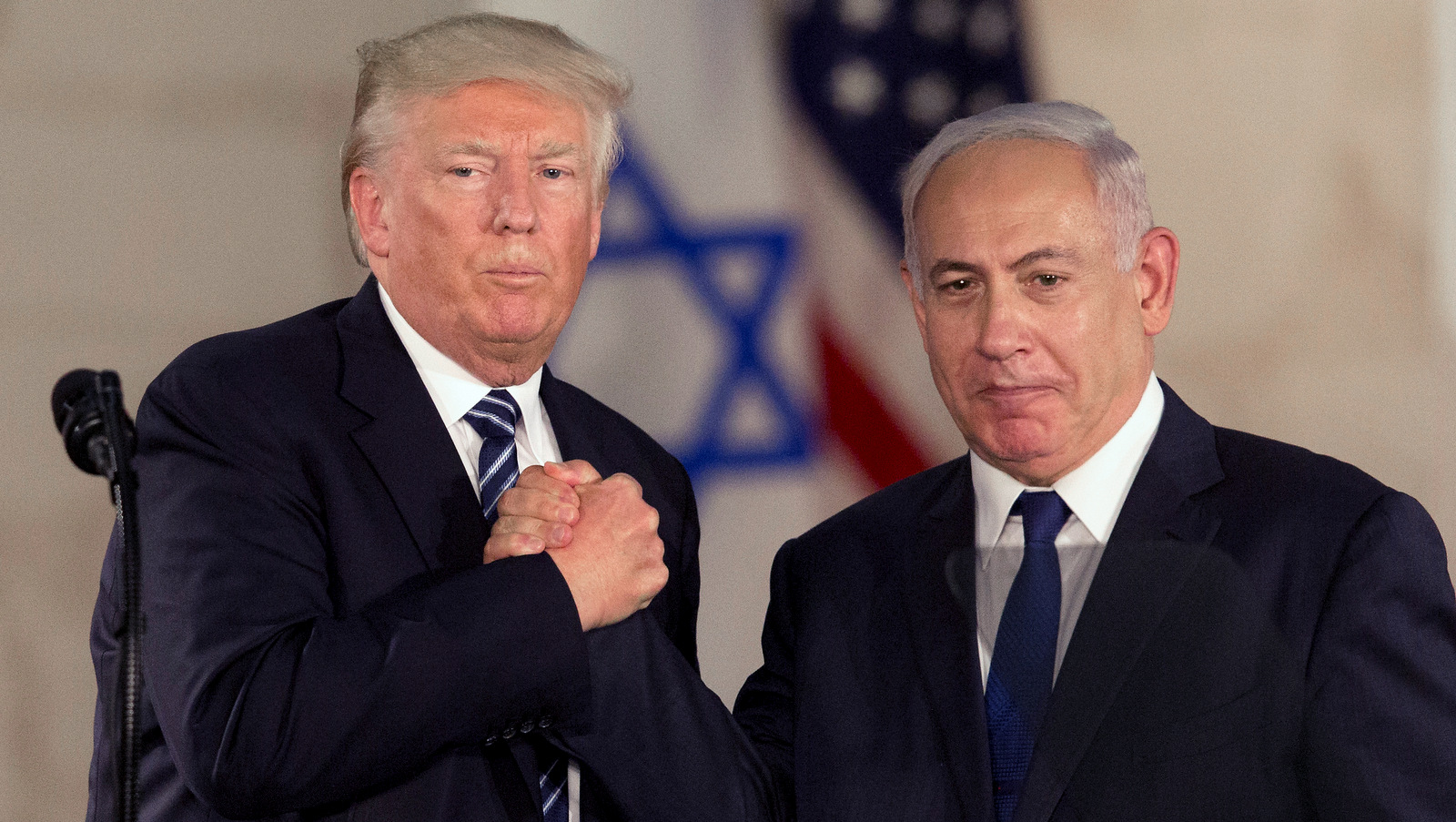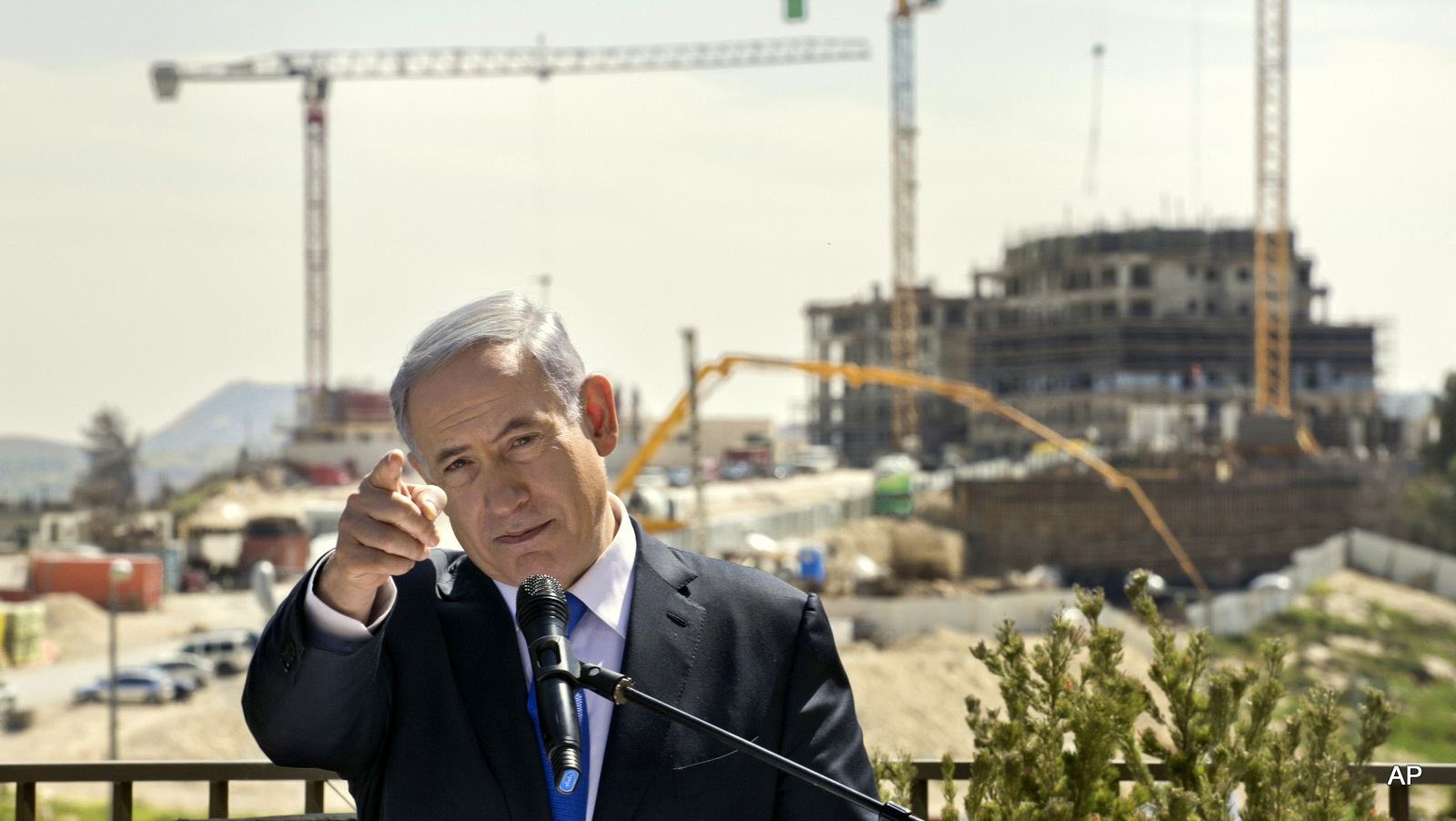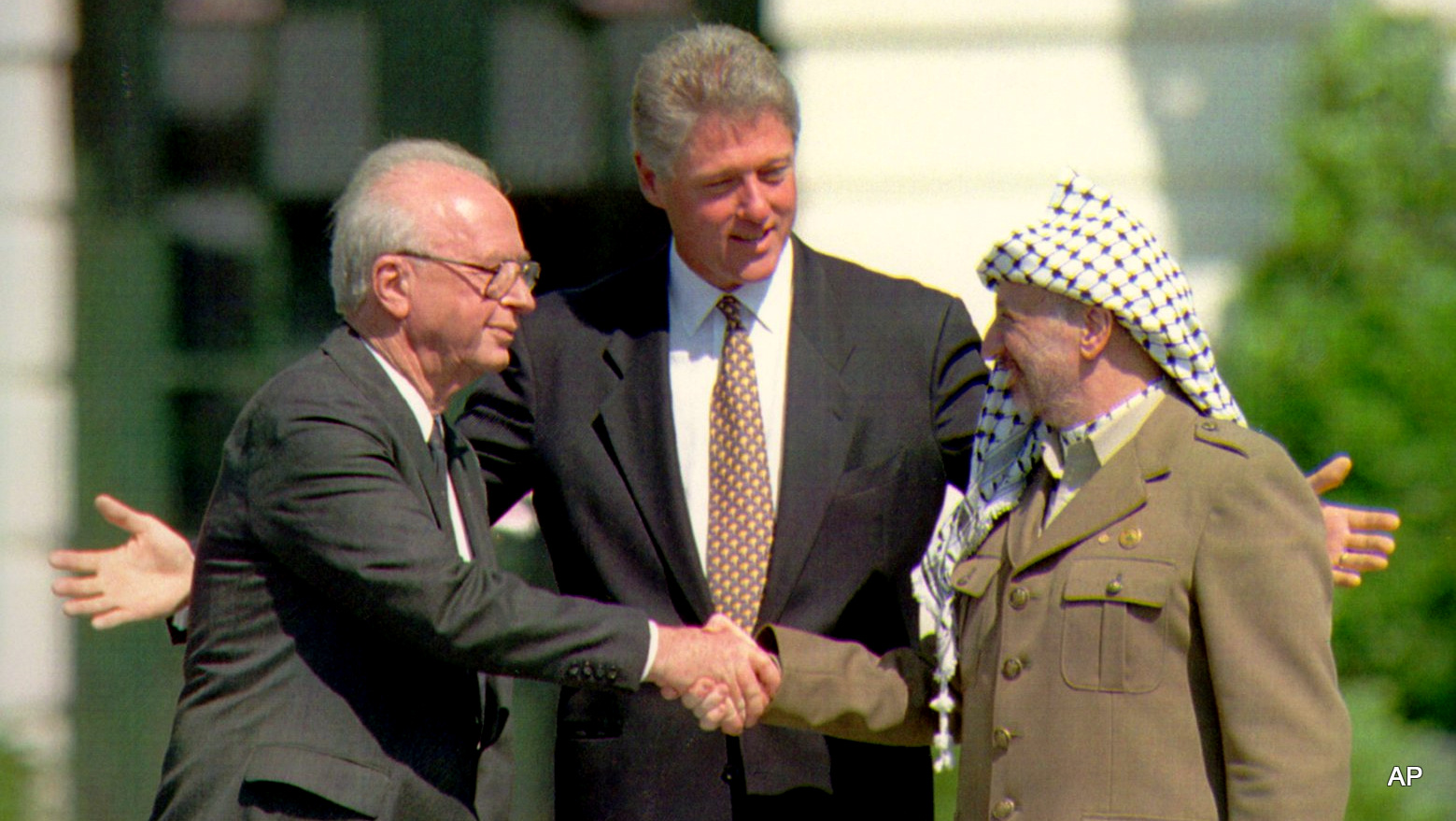On the eve of the Israeli election on 17 March 2015, Prime Minister Benjamin Netanyahu stated unequivocally that, if he were returned to power, a Palestinian state would not be established.
Any handover to Palestinians of territory on the West Bank occupied by Israel since 1967 would, he asserted, threaten Israel’s security:
I think that anyone who moves to establish a Palestinian state and evacuate territory gives territory away to radical Islamist attacks against Israel. The left has buried its head in the sand time and after time and ignores this, but we are realistic and understand.”
Asked if that meant there would be no Palestinian state during his tenure of office, he replied: “Indeed.”
In the election, he saw off his political rivals and his Likud party was returned once again as the largest party in the Knesset (with 30 seats out of 120). This enabled him to continue as Prime Minister in a new coalition government.
On 28 August 2017, at an event in the Barkan settlement to celebrate 50 years of Israeli occupation and colonization of the West Bank, thousands cheered Prime Minister Netanyahu as he restated his determination that Israel will hold on to the West Bank permanently. Here’s an extract from his speech:
We are here to stay forever. There will be no more uprooting of settlements in the land of Israel. … This is the inheritance of our ancestors. This is our land.
Imagine that on these hills were the forces of radical Islam. It would endanger us, it would endanger you, and it would endanger the entire Middle East.”
A month later on 29 September 2017, he repeated this unequivocal message to cheering crowds at a meeting in the Gush Etzion settlement.
Trump’s “ultimate deal”?


U.S. President Donald Trump and Israeli Prime Minister Benjamin Netanyahu shake hands at the Israel Museum, in Jerusalem, May 23, 2017. (AP/Sebastian Scheiner)
It is clear from these and similar statements by Prime Minister Netanyahu in recent years that he has no intention of withdrawing from any of the territories that Israel has occupied since 1967 so that a Palestinian state can come into existence. To do so, he has said repeatedly, would threaten the security of Israel.
So, the “peace process” is dead, isn’t it? Apparently not. The New York Times reported on 11 November 2017 that President Trump and his advisers “have begun developing their own concrete blueprint to end the decades-old conflict between Israel and the Palestinians” and achieve Trump’s “ultimate deal”. However, according to the President’s chief negotiator Jason Greenblatt, the Trump administration is “not going to impose an artificial timeline on the development or presentation of any particular set of ideas” and “will also never impose a deal”.
Missing from this New York Times report, and from most other commentaries on prospects for negotiating a “two-state solution”, is the fact that the Israeli Prime Minister has ruled out giving up territory to a Palestinian state. And Jason Greenblatt has confirmed that the Trump administration, like its predecessors, has no intention of forcing Israel to do so.
In the light of all this, the proposition that these negotiations, if they take place, will lead to a Palestinian state is a fantasy.
1999 Likud platform


Israeli Prime Minister Benjamin Netanyahu speaks as he visits a settlement construction site in Har Homa, east Jerusalem, March 16, 2015.
When Netanyahu was re-elected in March 2015 on a mandate of “no Palestinian state on his watch”, it should have convinced everybody that another bout of negotiations, of itself, hadn’t the remotest chance of bringing about a Palestinian state.
It is not as if Netanyahu has been an enthusiastic supporter of a “two-state solution”, who has suffered a temporary relapse on 16 March 2015. On the contrary, this pre-election promise mirrored an earlier one during the February 2009 election campaign, as a result of which he became Prime Minister. Then, he told supporters in Beit Aryeh, a small settlement in the West Bank:
The election on Tuesday will be about one issue – whether this place will remain in our hands or will be handed over to Hamas and Iran. We will not withdraw from one inch. Every inch we leave would go to Iran.”
This Netanyahu stance isn’t surprising since it is consistent with the 1999 Likud platform, which
- rejects the creation of a Palestinian state in the West Bank, and
- supports unlimited Jewish colonization of the West Bank (referred to as Judea and Samaria by Israel).
Here are the relevant points from the platform:
a. “The Government of Israel flatly rejects the establishment of a Palestinian Arab state west of the Jordan river.”
b. “The Jordan Valley and the territories that dominate it shall be under Israeli sovereignty. The Jordan river will be the permanent eastern border of the State of Israel.”
c. “Jerusalem is the eternal, united capital of the State of Israel and only of Israel. The government will flatly reject Palestinian proposals to divide Jerusalem”
d. “The Jewish communities in Judea, Samaria and Gaza are the realization of Zionist values. Settlement of the land is a clear expression of the unassailable right of the Jewish people to the Land of Israel and constitutes an important asset in the defense of the vital interests of the State of Israel. The Likud will continue to strengthen and develop these communities and will prevent their uprooting.”
This Likud platform may be nearly twenty years old, but these principles expressed in it have never been repudiated by Likud.
Tzipi Hotovely is Likud Knesset Member and an important figure in the modern Likud, its “ideological voice”, according to Haaretz. Netanyahu appointed her as Deputy Foreign Minister in his coalition government. As such, she is Israel’s second highest ranking diplomat, after Netanyahu himself, who acts as his own foreign minister.
In an inaugural address to Israeli diplomats around the world on 22 May 2015, she gave full expression to the principles embodied in the Likud platform, saying:
We need to return to the basic truth of our rights to this country. … This land is ours. All of it is ours. We did not come here to apologize for that.”
She justified her stance on the grounds that God had promised the land of Israel to the Jews and she set herself the task as a foreign minister of getting “the international community to recognize Israel’s right to build homes for Jews in their homeland, everywhere”.
It is sometimes said that the political status quo in Israel/Palestine is unsustainable.
Today, Netanyahu heads a coalition government with five other parties – Bayit Yehudi (Jewish Home) (8 seats), Yisrael Beiteinu (6), two ultra-Orthodox parties, United Torah Judaism and Shas (6 and 7 respectively) and the centrist Kulanu (10). With the possible exception of Kulanu, none of Likud’s coalition partners are in favor of a Palestinian state (see, for example, Jerusalem Post article How the parties stand on the Israeli-Palestinian peace process).
If Netanyahu were to seriously pursue a “two-state solution”, it would be in the teeth of opposition from his own party and from the parties that make up his governing coalition. It’s not going to happen.
Status quo unsustainable?


A worker stands by construction materials to unload at a Israeli Settlment unit in an east Jerusalem neighborhood. (AP/Sebastian Scheiner)
It is sometimes said that the political status quo in Israel/Palestine is unsustainable since Jews will “soon” be in a minority in the area under Israeli control – because of the higher Palestinian birth rate. Therefore, it is suggested, if the Jewish state is to continue to have a Jewish majority in the area under its control, it will have to relinquish control over at least part of the West Bank and the Palestinians who live there.
But, Palestinians in the West Bank and Gaza have no vote in Knesset elections – only Jewish settlers in the West Bank enjoy that privilege, which calls to mind the electoral system in apartheid South Africa (and undermines Israel’s pretensions to be a democratic state).
As long as West Bank Palestinians are denied that privilege, the Knesset electorate will continue to have a Jewish majority no matter how many Palestinians live on the West Bank – and the status quo can continue indefinitely.
This may not be a democratic arrangement, but it is an arrangement that has existed for 50 years since the occupation began in 1967 – and there has been no effective external pressure on Israel to bring it to an end. The Security Council has never applied any sanctions against Israel to force it to reverse its illegal territorial expansion in 1967. And, far from sanctioning Israel for its 50 years of occupation and colonization, the US and the EU have showered it with privileges.
Since 1967, the US has donated to Israel well over $100 billion in (mostly military) aid and it has protected it politically in international fora, for example, by vetoing resolutions critical of it in the UN Security Council. In recent years, the US has given it over $3 billion a year in military aid, making it the recipient of more US tax dollars than any other state in the world, even though its GDP per capita is on a par with that of the EU. And before he left office in January 2017, President Obama guaranteed that Israel would receive at least $38 billion in military aid over the following ten years.
Far from sanctioning Israel for its 50 years of occupation and colonization, the US and the EU have showered it with privileges.
As for the EU, it made Israel a privileged partner in 1995, allowing it to sign up to the Euro-Mediterranean Partnership, and granted it privileged access to the EU market in 2000 under the EU-Israel Association Agreement. Last August, the retiring EU ambassador to Israel, Lars Faaborg-Andersen, declared “we’re great supporters and great friends of Israel” and that the EU relationship with Israel is “very special” and “the most developed with any non-member” state. Clearly, Israel has nothing to fear from the EU, despite its 50-year record of occupation and colonization.
In marked contrast, the US and the EU immediately applied economic sanctions to Russia, when it took over Crimea in 2014, even though the takeover enjoyed the broad support of the people living there.
Giving the impression of negotiating


President Clinton gestures as Israeli Prime Minister Yitzhak Rabin, left, and Palestine Liberation Organization Chairman Yasser Arafat shake hands after signing a peace accord, September 13, 1993 on the South Lawn of the White House.
Of course, under certain circumstances, Netanyahu has been prepared to give the impression of negotiating about the creation of a Palestinian state, providing there are no awkward pre-conditions such as “freez[ing] all settlement activity, including natural growth of settlements”, to which Israel agreed in the 2003 Roadmap. And it can be guaranteed that he will ensure that the negotiations go nowhere.
That’s what happened during the last set of negotiations, which took place from July 2013 to April 2014 during the Obama administration. These negotiations went nowhere, even though, according to the New York Times, Secretary of State, John Kerry met President Abbas 34 times and Netanyahu roughly twice as many times during that period.
Despite that, the establishment of a Palestinian state was never seriously discussed – according to Barak Ravid writing in Haaretz, Netanyahu “flatly refused to present a map [of what a Palestinian state might look like] or even to discuss the subject theoretically” and “throughout the nine months of the talks Netanyahu did not give the slightest hint about the scale of the territorial concessions he would be willing to make”.
The “peace process” is now a useful instrument for Israel to continue its occupation and settlement expansion – since while negotiations are in prospect or in progress, what little international pressure there is on Israel to curtail its illegal activities in the occupied territories is removed, lest criticism of Israel’s behaviour gives it an excuse to break off negotiations.
As Israeli historian Professor Avi Shlaim has written:
The American-sponsored peace process, which began in 1991 after the Gulf war, is all process and no peace. It is a charade. It is pretence. It is worse than a charade because the peace process gives Israel the cover it needs to pursue its aggressive colonial project on the West Bank.”
The “peace process” is also convenient for the EU states – while negotiations are in prospect or in progress, they can pretend that a Palestinian state is around the corner (when they know it isn’t) and they can absolve themselves from devising and adopting a realistic policy to secure a Palestinian state, which would inevitably include sanctions against Israel to force it to withdraw from the occupied territories. That’s why EU states too are always keen on negotiations.
The “peace process” is also convenient for the US – to be seen to be doing something about the longstanding Israeli/Palestinian “problem” improves their relations with the Arab world and their general standing as a world power.
It’s a game in which everybody wins apart from the Palestinians, for whom life under Israeli military occupation continues to be a brutal reality.
The “peace process” is now a useful instrument for Israel to continue its occupation and settlement expansion
If this game is to continue, Netanyahu knows that he cannot always “flatly reject the establishment of a Palestinian Arab state west of the Jordan river”, in accordance with the 1999 Likud platform. To keep up the pretence of a viable “peace process”, he knows that, every so often, he must hold out the prospect of some kind of a Palestinian state being established.
Thus, when the newly elected President Obama pressed him to reopen negotiations with Palestinians in 2009, he allowed the phrase “Palestinian state” to pass his lips for the first time. In a speech at Bar-Ilan University on 14 June 2009, he said:
If we receive this guarantee regarding demilitarization and Israel’s security needs, and if the Palestinians recognize Israel as the State of the Jewish people, then we will be ready in a future peace agreement to reach a solution where a demilitarized Palestinian state exists alongside the Jewish state.”
A few months earlier, he had stated in his election campaign that he would “not withdraw from one inch” of the occupied territories.
And when the EU foreign policy chief Federica Mogherini visited Israel in May 2015, he reassured her that a Palestinian state was possible on his watch, even though he had ruled it out a couple of months earlier on the eve of the Knesset elections. He said:
I want to reiterate my commitment to peace. We want a peace that would end the conflict once and for all. My position hasn’t changed. … I support the vision of two states for two peoples – a demilitarized Palestinian state that recognizes the Jewish state.”
And so the game continues – Netanyahu pretends to believe in a “two-state solution” and the EU pretends to believe him, so that the pretence of a viable “peace process” can be maintained.
Palestinian children have become grandparents under occupation


Israeli police check the identification cards of Palestinian school children at a checkpoint in Jerusalem. (AP/Oded Balilty)
UN Secretary General, Ban Ki-moon, spoke for Palestinians on 27 January 2016, when he said:
After nearly 50 years of occupation — after decades of waiting for the fulfillment of the Oslo promises Palestinians are losing hope. Young people especially are losing hope. They are angered by the stifling policies of the occupation. They are frustrated by the strictures on their daily lives. They watch as Israeli settlements in the occupied West Bank, including East Jerusalem, expand and expand. …
The people of Palestine have lived through half a century of occupation, and they have heard half a century of statements condemning it. But life hasn’t meaningfully changed. Children have become grandparents. But life hasn’t changed.
We issue statements. We express concern. We voice solidarity. But life hasn’t changed. And some Palestinians wonder: Is this all meant to simply run out the clock? They ask: Are we meant to watch as the world endlessly debates how to divide land while it disappears before our very eyes?”
Ban Ki-moon went on to say:
The United Nations is committed to working to create the conditions for the parties to return to meaningful negotiations. That is the one and only path to a just and lasting solution — an end to the occupation that began in 1967, leading to a sovereign and independent State of Palestine, living side by side in peace and security with the State of Israel.”
Unfortunately, that is a pipe dream – without serious and sustained international sanctions being imposed on Israel to force it to end the occupation.
Otherwise, today’s Palestinian children will still be living under occupation when they are grandparents.
Top photo | Palestinian laborers work at a construction site in a new housing project in the Israeli settlement of Maale Adumim, near Jerusalem, Feb. 7, 2017. (AP/Oded Balilty)
David Morrison has written widely on the Middle East including two highly regarded pamphlets – ‘Iraq: Lies, half-truths & omissions’ and ‘Iraq: How regime change was dressed up as disarmament’ – on the deception perpetrated by the British government to induce the British public to support military action against Iraq. He is the co-author with Peter Oborne of “A Dangerous Delusion: Why the West is Wrong about Nuclear Iran” (published by Elliott & Thompson, 2013).

 Open Democracy is licensed under a Creative Commons Attribution-NonCommercial-ShareAlike 4.0 International License.
Open Democracy is licensed under a Creative Commons Attribution-NonCommercial-ShareAlike 4.0 International License.<!–
–>
Source Article from http://www.mintpressnews.com/the-peace-process-that-never-was-fading-hope-for-a-palestinian-state/235262/
Related posts:
Views: 0
 RSS Feed
RSS Feed

















 December 7th, 2017
December 7th, 2017  Awake Goy
Awake Goy 
 Posted in
Posted in  Tags:
Tags: 
















